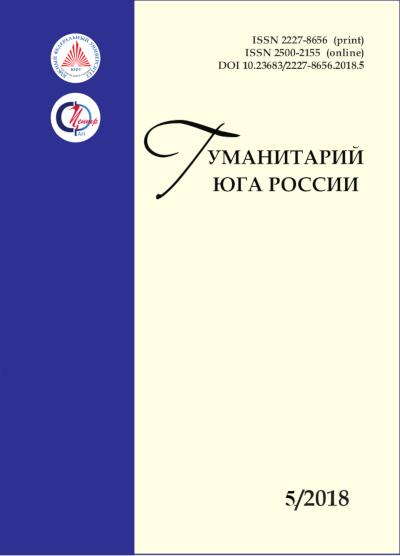Государственная политика в сфере культуры в зеркале социологии
Для цитирования
Карпухин О. И., Комиссаров С. Н. Государственная политика в сфере культуры в зеркале социологии // Гуманитарий Юга России. 2018. Том 7. № 5. С. 118-142. DOI: https://doi.org/10.23683/2227-8656.2018.5.10
Аннотация
В статье дано обобщение данных социологических исследований, в ходе которых были выявлены экспертные оценки и мнение населения о состоянии и перспективах государственной политики в сфере культуры.Результаты позволяют скорректировать и повысить эффективность государственной культурной политики на федеральном и региональном уровнях.Анализ опирается на данные, полученные в ходе общероссийского опроса экспертов «Цели и приоритеты культурной политики современной России», проведенного учеными Института социологии РАН, Института экономики РАН и Института искусствознания МК РФ, а также массового опроса населения РФ «Культурная политика России в региональном разрезе», осуществленного Центром социального прогнозирования.Результаты опросов показывают, что модернизация российского общества все более выявляет недооценку значимости культуры как системообразующего основания российской цивилизации, а также неадекватность культурной политики возрастающим запросам обновления общества.До недавнего времени культурная политика была сведена к бюджетно-раздаточному механизму. Фактически ее эффективность зависела от непрофильных министерств, преследовавших свои ведомственные цели. Отложенный во времени социальный эффект культурной деятельности не позволял адекватно оценить негативные последствия ослабления культурного и, соответственно, человеческого потенциала страны. В результате культурная политика практически выпала из стратегии развития государства, и только те усилия, которые предприняты в последние годы руководством страны, позволили реабилитировать культурную политику как составную часть государственной стратегии.Особенно важной эксперты считают разработку новой экономической политики в сфере культуры, в основе которой должно быть признание культуры не затратной статьей бюджета, а инвестиционно привлекательным полем вложения в человеческий капитал, определяющим перспективы развития общества.Увеличение бюджетных ассигнований необходимо дополнить гибкой и дифференцированной налоговой политикой, создающей стимулы для развития благотворительной деятельности, а также ликвидацией региональных диспропорций в финансировании культуры.Недееспособность существующей законодательной базы развития культуры требует не только новых управленческих и социальных технологий, но и политических решений для преодоления деструктивных противоречий между рыночными условиями и самой природой культуры как поля развития человеческой природы.В качестве сверхзадачи культурной политики эксперты признавали необходимость становления новой общероссийской ментальности, основанной на органичной связи духовных истоков национальной культуры и стремления к инновационному преобразованию окружающего мира, формирования новой российской социокультурной идентичности, восстанавливающей целостность отечественной истории, продуктивность единства многонациональной страны и многообразия национальных культур народов России как условия успешного выживания страны в ХХI в.
Ключевые слова:
экспертный опрос, культурная политика, государственная поддержка учреждений культуры в условиях рынка и развития новых информационных технологий, экономическая политика в сфере культуры, законодательство в сфере культуры
Литература
Абдулатипов Р.Г. Культурная повестка России // Российская газета. 2014.
Востряков Л.Е. Культурная политика: основные концепции и модели. СПб., 2013.
Востряков Л.Е. Рыночные реформы и региональные администраторы сферы культуры: социальный профиль // Общественные науки и современность. 2004. № 4. С. 87–96.
Горшков М., Гринберг Р., Сиповская Н., Рубинштейн А., Комиссаров С. И днем, и ночью кот ученый… // Российская газета. 2014. 24 апр.
Жидков В.С. Государственная культурная политика // Ориентиры культурной политики. 2001. № 6.
Ившина Т., Керн Ф., Кочеляева Н., Разло¬гов К., Санделл Т., Смирнова Т., Федорова Т. Обзор культурной политики в Российской Феде¬рации : аналит. докл. / Совет Европы; отв. ред. К. Разлогов, Т. Санделл. Ульяновск, 2013.
Карпухин О.И. Культурная политика. М., 1996.
Карпухин О.И. Управление процессами формирования культурной политики государства // Социально-гуманитарные знания. 1999. № 4.
Комиссаров С.Н. Российская литература и искусство на переломе веков и тысячелетий // Культурология в исходных научных понятиях, структурно-логических схемах, исторических феноменах культуры / под ред. Р.Г. Абдулатипова, В.А. Сапрыкина, С.Н. Комиссарова. М., 2011.
Культурная политика в Европе: выбор стратегии и ориентиры. М., 2002.
Культурная политика России в региональном разрезе : отчет по итогам социологического исследования / рук. Ф.Э. Шереги; Центр социального прогнозирования. М., 2014.
Митрошенков О.А. Пространство российской духовной культуры: испытание переменами // СОЦИС. 2005. № 11.
Черняховский С. О перспективах развития государственной политики России в области культуры : авторский доклад Изборскому клубу. 2016.
Востряков Л.Е. Культурная политика: основные концепции и модели. СПб., 2013.
Востряков Л.Е. Рыночные реформы и региональные администраторы сферы культуры: социальный профиль // Общественные науки и современность. 2004. № 4. С. 87–96.
Горшков М., Гринберг Р., Сиповская Н., Рубинштейн А., Комиссаров С. И днем, и ночью кот ученый… // Российская газета. 2014. 24 апр.
Жидков В.С. Государственная культурная политика // Ориентиры культурной политики. 2001. № 6.
Ившина Т., Керн Ф., Кочеляева Н., Разло¬гов К., Санделл Т., Смирнова Т., Федорова Т. Обзор культурной политики в Российской Феде¬рации : аналит. докл. / Совет Европы; отв. ред. К. Разлогов, Т. Санделл. Ульяновск, 2013.
Карпухин О.И. Культурная политика. М., 1996.
Карпухин О.И. Управление процессами формирования культурной политики государства // Социально-гуманитарные знания. 1999. № 4.
Комиссаров С.Н. Российская литература и искусство на переломе веков и тысячелетий // Культурология в исходных научных понятиях, структурно-логических схемах, исторических феноменах культуры / под ред. Р.Г. Абдулатипова, В.А. Сапрыкина, С.Н. Комиссарова. М., 2011.
Культурная политика в Европе: выбор стратегии и ориентиры. М., 2002.
Культурная политика России в региональном разрезе : отчет по итогам социологического исследования / рук. Ф.Э. Шереги; Центр социального прогнозирования. М., 2014.
Митрошенков О.А. Пространство российской духовной культуры: испытание переменами // СОЦИС. 2005. № 11.
Черняховский С. О перспективах развития государственной политики России в области культуры : авторский доклад Изборскому клубу. 2016.
Форматы цитирования
Другие форматы цитирования:
APA
Карпухин, О. И., & Комиссаров, С. Н. (2018). Государственная политика в сфере культуры в зеркале социологии. Гуманитарий Юга России, 7(5), 118-142. https://doi.org/10.23683/2227-8656.2018.5.10
Раздел
КУЛЬТУРА И ГЛОБАЛИЗАЦИЯ






